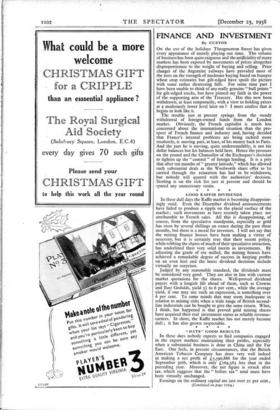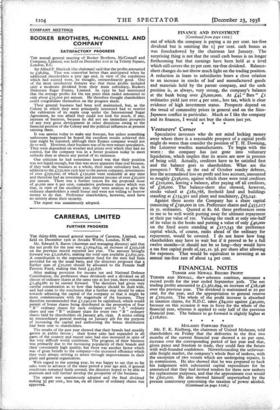FINANCE AND INVESTMENT
By .CUSTOS
ON the eve of the holidays Throgmorton Street has given every appearance of merely playing out time. The volume of business has been quite exiguous and the artificiality of many markets has been exposed by movements of prices altogether disproportionate to the weight of buying and selling. Prior charges of the Argentine railways have provided most of the rises on the strength of moderate buying based on bumper wheat crop estimates but gilt-edged have spoilt the picture with some rather distressing falls. For some time past I have been unable to think of any really genuine " bull points " for gilt-edged stocks, but have pinned my faith in the power of the supporting arm of the Treasury. Has this now been withdrawn, at least temporarily, with a view to holding prices at a moderately lower level later on ? I must confess that it begins to look like it.
The trouble just at present springs from the steady withdrawal of foreign-owned funds from the London market. Obviously, the French capitalist is much less concerned about the international situation than the pro- spect of French finance and industry and, having decided that France's internal problems are being tackled more resolutely, is moving part, at least, of his money back to Paris. And the part he is moving, quite understandably, is not his dollar balances but his balances held here. Hence the pressure on the pound and the Chancellor of the Exchequer's decision to tighten up the " control " of foreign lending. It is a pity that after ten months of " greater latitude," which has allowed such substantial deals as the Woolworth share offer to be carried through the relaxation has had to be withdrawn, but nobody will quarrel with the authorities' decision. Sterling is on the sick list just at .present and should be spared any unnecessary strain. * * * *
GOOD KAFFIR DIVIDENDS
In these dull days the Kaffir market is becoming disappoint- ingly staid. Even the December dividend announcements have failed to produce a ripple on the placid surface of the market; such movements as have recently taken place are attributable to French sales. All this is disappointing, of course, from the speculative standpoint, especially as gold has risen by several shillings an ounce during the past three months, but there is a moral for investors. I will not say that the mining finance houses have been making a virtue of necessity, but it is certainly true that their recent policy, while robbing the shares of much of their speculative attraction, has underlined their very solid merits as investments. By adjusting the grade of ore milled, the mining houses have achieved a remarkable degree of success in keeping profits on an even keel and the latest dividend decisions include virtually no surprises.
Judged by any reasonable standard, the dividends must be considered very good. They are also in line with current market quotations for the shares. Well-proved dividend payers with a longish life ahead of them, such as Crowns and East Gedulds, yield 5/ to 6 per cent., while the average yield, if one may use such an expression, is something over 6 per cent. To some minds that may seem inadequate in relation to mining risks, when a Wide tange of British second- line industrials can be bought to give the same return. What, I think, has happened is that proved gold mining shares have acquired their real investment status as reliable revenue- earners. In short, the Kaffir market has not merely become dull ; it has also grown respectable. * * * * 1‘ BATS" GOOD RESULTS In these days nobody expects to find companies engaged in the export markets maintaining their profits, especially when a substantial business is done in China and the Far East. One feels, in present circumstances, that the British American Tobacco Company has done very well indeed in making a net profit of £5,590,886 for the year ended September 3oth, which is only £169,563 less' than in the preceding year. Moreover, the net figure is struck after tax, which suggests that the " before tax" total must have been virtually unchanged.
Earnings on the ordinary capital are just over 21 per cent.,
(Continued on page 1104.)
FINANCE AND INVESTMENT
(Continued from page I 102.) out of which the company is paying a 20 per cent. tax-free dividend but is omitting the II per cent. cash bonus as was foreshadowed by the chairman last January. The surprising thing is not that the small cash bonus is no longer forthcoming but that earnings have been held at a level which still covers the 20 per cent. tax-free dividend. Balance- sheet changes do not throw much light on the trading position. A reduction in loans to subsidiaries bears a close relation to an increase in stocks of leaf and manufactured goods and materials held by the parent company, and the cash position is, as always, very strong, the company's balance at the bank being over £6,000,000. At Ai" Bats " LI ordinaries yield just over 4 per cent., less tax, which is clear evidence of high investment status. Prospects depend on the trend of commodity prices in general and on the Sino- Japanese conflict in particular. Much as I like the company and its finances, I would not buy the shares just yet. * * * *
Venturers' Corner
Speculative investors who do not mind locking money away where there is a reasonable prospect of a capital profit might do worse than consider the position of T. H. Downing, the Leicester woollen manufacturers. To begin with the worst : the company has just gone into voluntary liquidation, which implies that its assets are now in process of being sold. Actually, creditors have to be satisfied first and the balance goes to shareholders. What are the prospects ? Well, at the end of October sundry debtors, less the accumulated loss on profit and loss account, amounted to roughly £236,000, against which there were total creditors of £210,000, leaving a balance, after paying off all creditors, of £26,000. The balance-sheet also showed, however, stocks valued at £282,788, freehold land and buildings standing at £154,301 and plant and machinery, £63,242.
Against these assets the Company has a share capital consisting of £I90,000 in los. Preference shares and £455,217 in 5s. ordinaries. Quoted at 8s. 6d. these preferences seem to me to be well worth putting away for ultimate repayment at their par value of los. Valuing the stock at only one-half of its value in the books and putting a value of only £40,000 on the fixed assets standing at £217,543 the preference capital which, of course, ranks ahead of the ordinary for repayment, would be covered. I do not know how long shareholders may have to wait but if it proved to be a full twelve months—it should not be so long—they would have a tax free capital profit of, say, is. 3d. per share after allowing for expenses. That would be equivalent to investing at an annual tax-free rate of about 14 per cent.



































 Previous page
Previous page